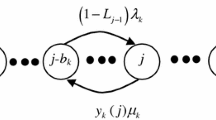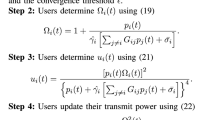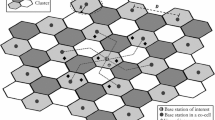Abstract
In this paper we examine the aggregate throughput of the uplink of a circuit switched CDMA data transmission system using a combination of theoretical and simulation techniques. The theoretical analysis determines the transmitter power levels and the number of active terminals that jointly maximize the throughput via standard optimization methods. We find that the terminal with the lowest path gain should transmit at maximum power and that all other terminals should aim for a common received power level that is higher than the received power from the terminal with lowest path gain. In addition we show that the system should admit the number of terminals that results in a target signal-to-interference-plus-noise ratio that depends on the processing gain and the noise power. A numerical example suggests that power control designed to achieve equal received power for all terminals results in aggregate throughput nearly as high as that obtained with optimum power control. This finding greatly simplifies the engineering problem from a network manager’s viewpoint.
Similar content being viewed by others
References
Adibi, M., & Vakili, V. (2007). Comparison of cooperative and non-cooperative game schemes for sinr-constrained power allocation in multiple antenna cdma communication systems. In: ICSPC 2007 IEEE international conference on signal processing and communications (pp. 1151–1154). doi:10.1109/ICSPC.2007.4728528.
Adibi, M., & Vakili, V. (2007). A game theoretic approach for sinr-constrained power control in 3g cellular cdma communication systems. In: PIMRC 2007 IEEE 18th international symposium on personal, indoor and mobile radio communications (pp. 1–5). doi:10.1109/PIMRC.2007.4394272.
Alpcan T., Basar T., Dey S. (2006) A power control game based on outage probabilities for multicell wireless data networks. IEEE Transactions on Wireless Communications 5(4): 890–899. doi:10.1109/TWC.2006.1618938
Alyfantis, G., Hadjiefthymiades, S., & Merakos, L. (2006). On fair and efficient power control in cdma wireless data networks. In: ICCCN 2006 proceedings 15th international conference on computer communications and networks (pp. 309–314). doi:10.1109/ICCCN.2006.286292.
Berggren F., Kim S. L. (2004) Energy-efficient control of rate and power in DS-CDMA systems. IEEE Transactions on Wireless Communications 3(3): 725–733
Boyer P., Stojanovic M., Proakis J. (2001) A simple generalization of the CDMA reverse link pole capacity formula. IEEE Transactions on Communications 49(10): 1719–1722
Choi J. G., Choi Y. J., Bahk S. (2007) Power-based admission control for multiclass calls in qos-sensitive cdma networks. IEEE Transactions on Wireless Communications 6(2): 468–472. doi:10.1109/TWC.2007.310941
Duan, X., Niu, Z., & Zheng, J. (2003). Utility optimization and fairness guarantees for multimedia traffic in the downlink of DS-CDMA systems. In: GlobeCom (pp. 940–944).
Fang, L., & de Figueiredo, R. (2007). Utility-based energy-efficient power control for multi-carrier ds/cdma. In: ISWPC ’07 second international symposium on wireless pervasive computing (pp. 291–295). doi:10.1109/ISWPC.2007.342617.
Feng N., Mau S. C., Mandayam N. (2005) Joint network-centric and user-centric radio resource management in a multicell system. IEEE Transactions on Communications 53(7): 1114–1118. doi:10.1109/TCOMM.2005.851629
Ghasemi, A., Faez, K., & Dehghan, M. (2006) A new pricing function for power control game in wireless data networks. In: VTC-2006 fall 2006 IEEE 64th vehicular technology conference (pp. 1–5) doi:10.1109/VTCF.2006.249.
Goodman, D. J., & Mandayam, N. B. (2001). Network assisted power control for wireless data. In: Mobile networks and applications, Vol. 6, (pp. 409–415). Dordrecht: Kluwer Academic.
Hayajneh, M., Abdallah, C., & Ibrahim, W. (2008) Impact of fading wireless channel on the performance of game theoretic power control algorithms for CDMA wireless data. In: AICCSA 2008. IEEE/ACS international conference on computer systems and applications (pp. 317–324). doi:10.1109/AICCSA.2008.4493552.
Jeon W. S., Jeong D. G. (2002) Call admission control for CDMA mobile communications systems supporting multimedia services. IEEE Transactions on Wireless Communications 1(4): 649–659
Kastrinogiannis, T., Karyotis, V., & Papavassiliou, S. (2008) On the problem of joint power and rate control in CDMA AD hoc networks. In: ISWPC 2008 third international symposium on wireless pervasive computing (pp. 78–82). doi:10.1109/ISWPC.2008.4556170.
Koskie S., Gajic Z. (2005) A nash game algorithm for sir-based power control in 3g wireless cdma networks. IEEE/ACM Transactions on Networking 13(5): 1017–1026. doi:10.1109/TNET.2005.857068
Lee, J. W., Mazumdar, R. R., & Shroff, N. B. (2002) . Downlink power allocation for multi-class CDMA wireless networks. In: INFOCOM, Vol. 3, (pp. 1480–1489).
Li B., Li L., Li B., Sivalingam K. M., Cao X. R. (2004) Call admission control for voice/data integrated cellular networks: Performance analysis and comparative study. IEEE Journal on Selected Areas in Communications 22(4): 706–718
Liu, J., & Zhou, J. (2005). Power control based on game theory and iterative multiuser detectors. In: Proceedings 2005 international conference on communications, circuits and systems, Vol. 1, (pp. 458–461). doi:10.1109/ICCCAS.2005.1493449.
Mathar R., Schmeink A. (2008) Proportional qos adjustment for achieving feasible power allocation in cdma systems. IEEE Transactions on Communications 56(2): 254–259. doi:10.1109/TCOMM.2008.041173
Meshkati F., Chiang M., Poor H., Schwartz S. (2006) A game-theoretic approach to energy-efficient power control in multicarrier cdma systems. IEEE Journal on Selected Areas in Communications 24(6): 1115–1129. doi:10.1109/JSAC.2005.864028
Meyer, C. D. (2000). Matrix analysis and applied linear algebra. Society for industrial and applied mathematics.
Nagarajan, V., & Dananjayan, P. (2008). A game theoretic power control algorithm with pricing for spectral efficient communication in mimo MC-DS/ CDMA system. In: Third international conference on broadband communications, information technology & biomedical applications, 2008 (pp. 129–136). doi:10.1109/BROADCOM.2008.33.
Nagarajan, V., & Dananjayan, P. (2008). A novel game theoretic power control algorithm for spectral efficient communication for mimo mc-ds/cdma system. In: IEEE region 10 conference TENCON-2008 (pp. 1–6). doi:10.1109/TENCON.2008.4766658.
Oh S. J., Zhang D., Wasserman K. M. (2003) Optimal resource allocation in multiservice CDMA networks. IEEE Transactions on Wireless Communications 2(4): 811–821
Rodriguez, V. (2002). From power levels to power ratios and back: A change of domain and its modeling implications. WICAT Tech. Rep. 02-011, Polytechnic University. http://wicat.poly.edu/reports.
Rodriguez, V. (2002). Maximizing a sigmoid with respect to its argument. WICAT Tech. Rep. 02-010, Polytechnic University. http://wicat.poly.edu/reports.
Rodriguez, V. (2004). A robust and tractable analytical foundation for radio resource management: Centralized and decentralized optimizations involving data and media communication. Ph.D. thesis, Polytechnic University, Brooklyn, New York.
Rodriguez, V., Goodman, D. J. (2002). Improving a utility function for wireless data. WICAT Tech. Rep. 02-009, Polytechnic University. http://wicat.poly.edu/reports.
Rodriguez, V., Goodman, D. J., & Marantz, Z. (2004). In: IEEE WCNC power and data rate assignment for maximal weighted throughput in 3G CDMA: A global solution with two classes of users.
Saraydar C. U., Mandayam N. B., Goodman D. J. (2002) Efficient power control via pricing in wireless data networks. IEEE Transactions on Communications 50(2): 291–303
Singh S., Krishnamurthy V., Member S., Poor H. V. (2002) Integrated voice/data call admission control for wireless DS-CDMA systems. IEEE Transactions on Signal Processing 50(6): 1483–1495
St Jean, C., & Jabbari, B. (2006). Game-theoretic delay-sensitive multirate power control for cdma wireless networks with variable path loss. In: WCNC 2006. IEEE wireless communications and networking conference, Vol. 1, (pp. 42–47). doi:10.1109/WCNC.2006.1683438.
Sung C. W., Wong W. S. (2002) Power control and rate management for wireless multimedia CDMA systems. IEEE Transactions on Communications 49(7): 1215–1226
Tamilarasan, N., Lenin, S., & Dananjayan, P. (2009) Call admission control for cdma systems with adaptive modulation. In: INCACEC 2009 international conference on control, automation, communication and energy conservation (pp. 1–6).
Ulukus., S., & Greenstein, L. (2000). Throughput maximization in CDMA uplinks using adaptive spreading and power control. In: IEEE ISSSTA, Vol. 2, (pp. 565–569).
Viterbi A. M., Viterbi A. J. (1993) Erlang capacity of a power controlled CDMA system. IEEE Journal on Selected Areas Communications 11(6): 892–900
Xiao M. N., Shroff N. B., Chong E. K. P. (2003) A utility-based power control scheme in wireless cellular systems. IEEE/ACM Transactions on Networking 11(2): 210–221
Zhong, W., Xu, Y., & Cai, Y. (2005). Distributed game-theoretic power control for wireless data over mimo cdma system. In: Proceedings. 2005 international conference on communications, circuits and systems, Vol. 1, pp. (237–241). doi:10.1109/ICCCAS.2005.1493401.
Author information
Authors and Affiliations
Corresponding author
Rights and permissions
About this article
Cite this article
Marantz, Z., Orenstein, P. & Goodman, D. A Power Control Based Admission Algorithm for Maximizing Throughput in a CDMA Network. Wireless Pers Commun 59, 741–764 (2011). https://doi.org/10.1007/s11277-010-9934-6
Published:
Issue Date:
DOI: https://doi.org/10.1007/s11277-010-9934-6




